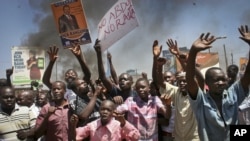NAIROBI —
A visiting African Union (AU) delegation says it is satisfied with the steps Kenya's government and civil society have taken to avoid violence in the March 4 general election. The vote of confidence comes despite reports of political tension and clashes in parts of the country during last week's party primaries.
With less than two months before Kenya goes to the polls, a delegation from the African Union and the regional economic bloc, COMESA, has wrapped up a week-long pre-election assessment mission in the country.
Members of the visiting delegation say they have come to show their solidarity with the people of Kenya as they prepare to elect a new government.
An AU panel member from South Africa, Brigalia Bam, said her delegation has been evaluating Kenya's efforts to prevent election disputes.
"So far we are impressed by the journey the people of Kenya have taken in the last five years since the unfortunate events of 2007-2008 - the new constitution of this country; the by-elections; the [constitutional] referendum; already the registration of the people who will be in the paper voters rolls; and, of course, the first event, the first phase which we refer to as [an] experiment of the electoral system; and the primaries that [have] taken place,” said Bam.
The results of Kenya's last presidential election in 2007 were disputed, sparking interethnic fighting that left more than 1,000 people dead and hundreds of thousands displaced from their homes.
Local primaries last week were marred by delays, confusion and violence in some parts of the country as angry voters stormed vote counting centers and took to the streets, furious over allegations of vote-rigging.
Despite the chaos in the primaries, Bam said the level of violence was not too alarming since there were no reported deaths.
“At this stage we feel that its was probably good to have primaries. We think that - this is an opinion - the system is probably too complex and people were experimenting with it. We are not sure whether the political parties themselves had been prepared for it. We are not sure everything has been in place because the whole system is new,” said Bam.
As part of the new system, voters for the first time are selecting candidates to positions created by the new constitution, including the posts of governor, senator and women's representative.
Ambassador Simbi Mubako of Zimbabwe, who is on COMESA's committee of elders, says the Kenyan people are ready to exercise their right to vote and urged them to do so in a peaceful manner.
“Africa is looking to Kenya to conduct itself in [a] dignified and peaceful manner not only because we want orderliness in Kenya itself, but because Kenya is [a] very important country in Africa and particularly in this region,” said the ambassador.
With political reforms and mechanisms in place, Kenyans and their African neighbors are trying to avoid violence on March 4, when the vote is scheduled to take place.
With less than two months before Kenya goes to the polls, a delegation from the African Union and the regional economic bloc, COMESA, has wrapped up a week-long pre-election assessment mission in the country.
Members of the visiting delegation say they have come to show their solidarity with the people of Kenya as they prepare to elect a new government.
An AU panel member from South Africa, Brigalia Bam, said her delegation has been evaluating Kenya's efforts to prevent election disputes.
"So far we are impressed by the journey the people of Kenya have taken in the last five years since the unfortunate events of 2007-2008 - the new constitution of this country; the by-elections; the [constitutional] referendum; already the registration of the people who will be in the paper voters rolls; and, of course, the first event, the first phase which we refer to as [an] experiment of the electoral system; and the primaries that [have] taken place,” said Bam.
The results of Kenya's last presidential election in 2007 were disputed, sparking interethnic fighting that left more than 1,000 people dead and hundreds of thousands displaced from their homes.
Local primaries last week were marred by delays, confusion and violence in some parts of the country as angry voters stormed vote counting centers and took to the streets, furious over allegations of vote-rigging.
Despite the chaos in the primaries, Bam said the level of violence was not too alarming since there were no reported deaths.
“At this stage we feel that its was probably good to have primaries. We think that - this is an opinion - the system is probably too complex and people were experimenting with it. We are not sure whether the political parties themselves had been prepared for it. We are not sure everything has been in place because the whole system is new,” said Bam.
As part of the new system, voters for the first time are selecting candidates to positions created by the new constitution, including the posts of governor, senator and women's representative.
Ambassador Simbi Mubako of Zimbabwe, who is on COMESA's committee of elders, says the Kenyan people are ready to exercise their right to vote and urged them to do so in a peaceful manner.
“Africa is looking to Kenya to conduct itself in [a] dignified and peaceful manner not only because we want orderliness in Kenya itself, but because Kenya is [a] very important country in Africa and particularly in this region,” said the ambassador.
With political reforms and mechanisms in place, Kenyans and their African neighbors are trying to avoid violence on March 4, when the vote is scheduled to take place.




